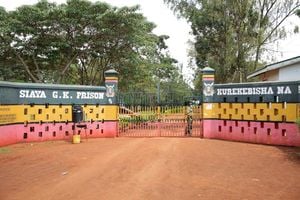EU rejects French beans over use of banned spray

A resident displaying a can of Dimethoate in Kerugoya town. The chemical is sold in various agro-chemical retail shops in all the trading centres in the county. Photo/FILE.
What you need to know:
- Dimethoate was banned by the European Union in 2009, and Kenya followed suit last year.
- Subsequently, the ministry erected billboards in strategic places to advise farmers of the ban on dimethoate.
- Mwea East district agricultural officer S. K. Manene said although there was not a total ban on dimethoate, it should not be used to spray French beans and other green vegetables.
Farmers who grew French beans in Kirinyaga County face huge financial losses after their produce due for export to Europe was rejected for containing high levels of banned agro-chemicals believed to cause cancer.
Farmers who form nine groups dubbed Kangai Tisa were shocked when they were informed that they had failed to observe Global Good Agricultural Practices (Global-GAP).
Testing revealed the beans were laced with dimethoate and other organophosphate chemicals which have been banned by the ministry of Agriculture.
The chemicals, particularly the dimethoate, are being phased out of the market following reports that they are responsible for a rise in cancer in the country.
Dimethoate was banned by the European Union in 2009, and Kenya followed suit last year.
Subsequently, the ministry erected billboards in strategic places to advise farmers of the ban on dimethoate.
However, a survey by the Sunday Nation established that the chemical is still being sold by retail traders at Kagio, Kimbimbi, Kanjinji, Difathas, Ngurubani, Kerugoya and other trading centres in Kirinyaga County.
The chemical reported to be in about 25 products kills insects on fruits and vegetables.
The more than 1,000 farmers in Kirinyaga are now worried since 12 tonnes of French beans they delivered to the Kenya Horticultural Export Company could not be exported.
They said unpicked produce was rotting in farms at Kangai location and other parts of the county.
Mr Peter Kanyuiro said he had lost 1.2 tonnes of beans worth Sh80,000.
The chairman of Kangai Tisa groups said he and his colleagues had invested heavily in the crop and had now been driven to despair.
“We spent all the money on the farming, but unfortunately we got nothing after delivery,” he said.
Mr Kanyuiro said the groups under his leadership had observed all the conditions of the Global-GAP but were shocked when their produce was declared unfit for human consumption.
He appealed to the government to explore ways of cushioning farmers against the losses.
“Horticultural farming is our livelihood. Now we have no money to start farming afresh, educate our children and meet other financial obligations,” he said.
Another farmer, Kariuki Maina, 50, said he had delivered produce worth Sh70,000 which went to waste.
The farmers called on the government to investigate the matter.
Following the crisis, area chief Hezekiel Gathura convened a baraza on last week at Kangai trading centre to discuss the issue.
Mr Gathura observed that the matter was serious as a majority of horticultural farmers had been affected.
He advised the farmers to identify those who were using the banned chemical.
Area district commissioner Karugu Wahome said the issue was of grave concern and should be handled by agricultural experts.
“The Agricultural department should move in swiftly and dig deeper what has really happened,” he said.
Mwea East district agricultural officer S. K. Manene said although there was not a total ban on dimethoate, it should not be used to spray French beans and other green vegetables.
“It is true that the ministry is discouraging horticultural farmers from using the chemical because it is harmful,” he said.
Mr Manene said he and other officials were sensitising farmers on the dangers of spraying the chemical on the beans.
A local agricultural officer, Mr George Mwai, said farmers had been educated on safe farming practises and the adverse effects of some of the pesticides.
Mr Mwai said farmers should follow instructions carefully to avoid incurring losses.
A senior official from the Kenya Horticultural Export Company based at Kimbimbi factory, Mr Paul Mwaura, said the matter was sensitive and declined to comment.
Mwea parliamentary candidate Josphat Kabinga and former councillor Mureithi Kang’ara said the loss was enormous and urged the government to intervene.
“I can’t understand how all farmers who have been in this agribusiness for many years can grow and deliver produce containing banned chemicals,” Mr Kabinga said.
“It is unbelievable.”
He called for more tests to be carried out to establish the truth.




